
The current structure of the Pakistani economy was shaped to a considerable extent by the past. So were its relations with many countries in the region. It helps to understand how that happened in order to deal with the problems to which the past may have contributed. One possible solution to the many problems Pakistan faces today is to improve the country’s relations with India, the sister state to the south. Why focus on relations with India is a question that needs a detailed answer.
Pakistan, a crisis prone country, is now faced with its most difficult test. The government that holds the reins of power in Islamabad is preparing to complete its first term in office. Will that happen and will the PPP-led coalition in Islamabad call for another set of elections sometime before the end of Spring of 2013? If the country passes that critical mark on the way to its further political evolution, it would have possibly set itself on a course it has been seeking to travel on ever since it gained independence nearly 65 years ago. There are many hurdles over which it must jump before the country reaches that point. If it does, would that mean the end of the period of crises that began the moment the military passed the baton to an elected set of people’s representatives?
The period since March 2008 — when the current prime minister from the PPP took office — has seen many crises not just in politics but in a number of other areas as well. Nothing has remained unaffected — not economics, not the society at large, not relations with the world beyond the borders. Pakistan’s torrid history is speckled with crises. They arrived at regular intervals to claim the attention of the people in power. This preoccupation with finding solutions to crises deflected a series of policymakers from evolving a long-term vision for developing the economy and shaping the political system.
Crises began the day the British decided to transfer power not to one, but to two successor states. One state — India — was created on the basis of an idea that the state structure could be erected that would serve all people, all the time. That idea has mostly worked. But the ‘idea of Pakistan’ did not work. Pakistan was given statehood in the belief that the Muslims of British India could not live in a political system and in an economy dominated by people from other faiths. They had to have a country of their own which they could mould according to their sets of beliefs. These were different from those on which India would build its own state structure.
Less than a quarter century after gaining independence, Muslim Pakistan broke into two parts. The one in the east used ethnicity to create the state of Bangladesh. As the name of the new country implies, it was to be a country for ethnic Bengalis. The other part in the west, then called West Pakistan, retained the name of Pakistan. The new Pakistan was multi-ethnic, spoke several languages but did not know what should be the basis of nationhood.
Is it necessary for Pakistan to define the meaning of nationhood? After all, hundreds of new states have been created since the founding of Pakistan and only a handful of those are based on an ‘idea’. However, Pakistan having been established on the basis of a distinct idea, believes that it must have a reason for its existence as a separate state. For more than half a century, it used India as the basis of nationhood. Perceived Indian threat was used for decades by various groups of Pakistani leaders to create a sense of statehood among a very diverse citizenry. To some extent, the impression that India was set to undo Pakistan was justified by a series of actions taken by the first Indian administration under prime minister Jawaharlal Nehru. It seemed determined to cripple Pakistan before it could develop its own economic legs on which it could stand. This India centric approach may have made sense in the first decade or so after independence since, a number of crises were created by the hostility of the administration headed by Nehru. But it has now lost its relevance.
The drama of crises in Pakistan divides into three acts. The first, as already suggested, figured India. New Delhi took a number of actions — some real, others more feared than real — that made the leaders of Pakistan extremely nervous about the intentions of India towards their country. The second figured leaders in Pakistan with strong ideological preferences. General Ayub Khan, the first military president, favoured the private sector to take the lead in developing the economy. Zulfikar Ali Bhutto was disposed towards a socialist approach, choosing to expand the role of the state in economic management. General Ziaul Haq was inclined to ‘Islamise’ the economy without fully appreciating what that implied.
The third act in the drama is the one that is playing out at this time. Most of the crises the country currently faces are the product of poor governance. In this context, the term ‘poor governance’ needs to be defined in broad terms. It means more than corruption, of which there is a great deal in the country. It also means neglecting the creation of institutions without which no economy can develop. One thing is clear about this on-going, three-act drama. It is only by building the capacity to deal with crises that their recurrence can be prevented.
Published in The Express Tribune, February 21st, 2012.
COMMENTS (23)
Comments are moderated and generally will be posted if they are on-topic and not abusive.
For more information, please see our Comments FAQ







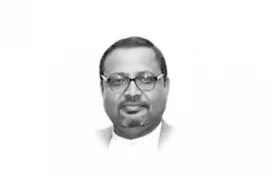

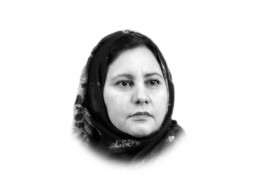

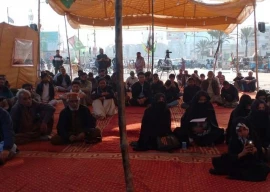
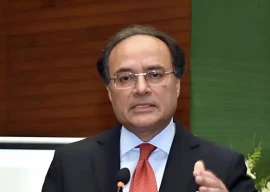
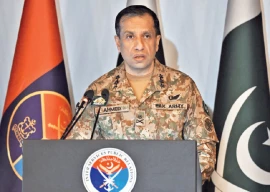
1720030784-0/Smog-free-Lahore-(14)1720030784-0-270x192.webp)
1733421998-0/New-Project-(1)1733421998-0-270x192.webp)
1735283394-0/sidra--(9)1735283394-0-270x192.webp)


"Crises began the day the British decided to transfer power not to one, but to two successor states. One state — India — was created on the basis of an idea that the state structure could be erected that would serve all people, all the time. That idea has mostly worked. But the ‘idea of Pakistan’ did not work. Pakistan was given statehood in the belief that the Muslims of British India could not live in a political system and in an economy dominated by people from other faiths. They had to have a country of their own which they could mould according to their sets of beliefs. These were different from those on which India would build its own state structure."
Pakistan's biggest problem is that the entire countries focus is on India and India centric policies. People forget that most Pakistanis are ethnically similar to Indians and are descendants of Hindus and not of Arab Muslims. History has shown that faith alone does not create nationhood. In 1971 the majority of Pakistani Muslims sought independence from the minority and created Bangladesh. If faith were a major bond, then the entire Arab world would be one nation as the majority not only have a common faith, but also have a common language and culture.
Look at the difference between India and Pakistan today; one a faith based country and the other a secular one.
@Riaz Haq: In theory you see an annual growth rate of 5%. What did this bring us? More poverty, crime and terrorism. Even if the growth numbers are true, reality is different. Zia the dictator did nothing but support fundamentalists and is responsible for the state of affairs in the country today. Musharraf the dictator supported ethnic groups and created a bubble economy based on US aid with no fundamental change in agriculture and industry.
p.s Pakistan was the top country in N11 (The Next 11).... give us a time....we are coming back.!
@Riaz haq i support that point of yours......the indian counterparts always taunt us on this point but they don't know that foreign Aid has strings attached..... they are on certain terms and conditions.... after all its only recently that India has not been receiving higher amount of aid.....secondly,when Russia got disintegrated, India had the same situation....and out of panic they liberalized their economy........ayesha's point if accepted for a while, then why we had neck to neck growth rates in mid 90's till 2004, Further Between 2006 – 08 in Asia, Pakistan was the 10th largest receiver of foreign direct investment according to (UNCTAD,2008).... the bangladesh incident is an Old event "dil ko bahlanain kayliay yay bahana ucha hai ghalib" our currencies were as equal as indian rupee. Its only recent that indian rupee got a slight increase..... but non the less....when our country gets out of the war situation. We will be having massive growth....give us a time!.......... If the country of our geographical size can be a nucleur state and can have youngest record holders then everything is possible...........
@ Ayesha Khan: US aid has been miniscule relative to Pakistan's GDP. Foreign aid has had only marginal impact on Pakistan's economic growth rate. The real difference between civilian and military govts has been in the massive use of political patronage at tax payers' expense and negative impact on public policy under political govts, as explained well by Dr. Mahbubul Haq.
Please read: http://www.riazhaq.com/2011/07/political-patronage-trumps-public.html
@ Ayesha Khan
When economists talk about Pakistan, they only include post 1971 Pakistan (even population figures don't include East Pakistan). . Stop making assertions based on thin air.
@Riaz Haq: Hello sahab.. why are you selectively picking up negative information. yes, whole world is slowing down but don't worry things would be better.. India is going through transparency revolution.. all the corruption is getting exposed and corrupt people are going to jail. such things do not happen in pakistan. So you feel happy about it. And forget china, no-one knows what happens inside the country. And USA :- corruption by MNCs are legalized... If a country slows down then it does not mean it is going to die.. and regarding FT .. their new hindu rate of growth for India is 6% and not 3%.. :).their report is absolutely correct. These kind of reports has been published regularly in Economic Times also..Everyone knows that if India does not go for second generation reform then it would be difficult to grow by 8-9%... hope it clarifies a bit.. You should follow Economic Times for better understanding of Indian economy , it's a nice newspaper.
@riaz Also you article looks like an old news, much of the story is changed in first few months for this year.
@riax haq why don't you answer ayesha khan's question?
@Riaz Haq: The Pakistani economy from the sixties to the eighties grew on American patronage. For all those years Pakistan and all Pakistani's were staunch all weather friends of the Americans and it was American aid and the partial application of the American economic policies to help a few privileged elites in Pakistan that helped the Pakistani economy grow. The moment the Americans realized they have no use for the Pakistanis (post the 80's), that the aid, be it economic or defense started to taper off.
It wasn't some ingenuity on the part of Pakistan that helped it grow, it was AMERICA, the mother ship, the sole uberpower helping a vassal state.
http://www.dawn.com/2012/02/15/can-pakistan-survive-without-us-aid.html http://www.newyorker.com/reporting/2011/05/16/110516fafactwright
@Californian: "“Where will you go next?” is not a rhetorical question. This is what Mr.Burki’s article is about."
The last three or four years do not make a trend. The current situation of stagnation can not and will not last. It's much more important to look at the entire 64 year history of Pakistan's average economic growth rate of over 5% to assess the future.
@Riaz Haq: That was then, and now is now. Where are India and Pakistan in the current world? "Where will you go next?" is not a rhetorical question. This is what Mr.Burki's article is about.
@Riaz Haq: I am not sure whether dictator's better governance led to higher growth rates or was it their ability to commit Pakistan's land and soldiers to US goals without oversight. That was the case for Zia in the 80s and Musharraf in early part of this century.On the other hand Pressler amendment kicked in during the 90s when democracy was operating. Even Musharraf's economic performance was not particularly notable until he joined the GWOT.
One other thing that contributed to increasing per capita GDP is separation of Bangladesh. Though it was a traumatic event politically, it was a different story economically. When 55% of population that has 33% of GDP leaves then automatically the per capita GDP of the remaining part gets bumped up by 44%.
Great article. I agree that institution build-out, long-term orientation in policy making, meritocracy, and better regional integration (on political, social, and economic levels) is all we need to take-off.
Author started well but missed something at the end. He could have explained well in detail. may be constraint of words stopped him in doing so.
@Raja Rao: If "the (Pak) economy had no choice but to grow", then how do you explain its rate of growth at more than twice the rate of India's economic growth until late 1980s?
http://www.riazhaq.com/2011/09/indian-economy-slowing-to-hindu-rate-of.html
Kashmir-> Fear of India -> Military Build up -> Military Dominance -> Destruction of other institutions -> Destruction of Democracy -> Circular Debts -> Economy stagnating -> Poverty Increasing -> Nearing bankruptcy -> Pakistan rated as 12th most failed state.
Simple..
Its been clear that India has been able to hurt Pakistan without even lifting a finger. Just the thought of India is enough for Pakistan to commit a slow suicide. What an interesting turn of events.
India is concentrating on how to better its economy and better govern its peoples, Pakistan is still obsessed with how to keep this imaginary threat from India out, in the process ignoring everything else that really matters!
A very objective piece. . I hope that Indians won't jump on it and start attacking the artile (like they did before).. It seems they are highly insecure and are not confident enough to ignore some criticism AND Sadly, they claim to be final authority/truth about everything where India can commit no mistake!
Fine we can blame some of our problems on India or on the US for not giving us enough aid, or not enough F16s, or what have you. But there's no denying that that's true of every nation. India would be more than justified in blaming some of her problems on us or on China, or on the UK who ruled us earlier.
Fact is we're responsible for our own state of affairs. No one else. Our actions broke up the nation. We accepted our military's interference in state affairs, and have allowed it to take the country from crisis to crisis. There will be no mitigation until we accept responsibility, and put things right. We need to stop believing in charismatic peddlers of illusions. Pakistanis have a propensity to look for easy answers. But in reality there are only hard truths.
Pakistan's growth during the earlier years was not 'because of' good governance but 'in spite of'' that. In other words the economy had no choice but to grow and with good governance would have grown faster.
While the author makes a valid point, it could have been explained much better. Much of the very high military expenditure, the Afghanistan cauldron and supporting the Taliban and other militants and such other policies are derived from the historical imbibed views on India and much of the military and politicians feed and promote this. Normal relations with India, can change this equation completely. Its only when people vote (democracy persists) and they vote for development or who can best get them development and show such preference can there be real progress on the Relationship with India. Live and Let Live !!!
Pakistani economy grew at a fairly impressive rate of 6 percent per year through the first four decades of the nation's existence. In spite of rapid population growth during this period, per capita incomes doubled, inflation remained low and poverty declined from 46% down to 18% by late 1980s, according to eminent Pakistani economist Dr. Ishrat Husain. This healthy economic performance was maintained through several wars and successive civilian and military governments in 1950s, 60s, 70s and 80s until the decade of 1990s, now appropriately remembered as the lost decade.
After a relatively peaceful but economically stagnant decade of the 1990s, the year 1999 brought a bloodless coup led by General Pervez Musharraf, ushering in an era of accelerated economic growth that led to more than doubling of the national GDP, and dramatic expansion in Pakistan's urban middle class.
Why is it that Pakistani economy has done well under military governments and performed poorly when led by politicians? To put it all in perspective, let's recall how late Dr. Mahbub ul-Haq, the renowned Pakistani economist who is credited with the idea of UNDP's human development index (HDI), explained the corrosive impact of political patronage on economic policy in Pakistan.
http://www.riazhaq.com/2010/09/brief-history-of-pakistani-economy-1947.html